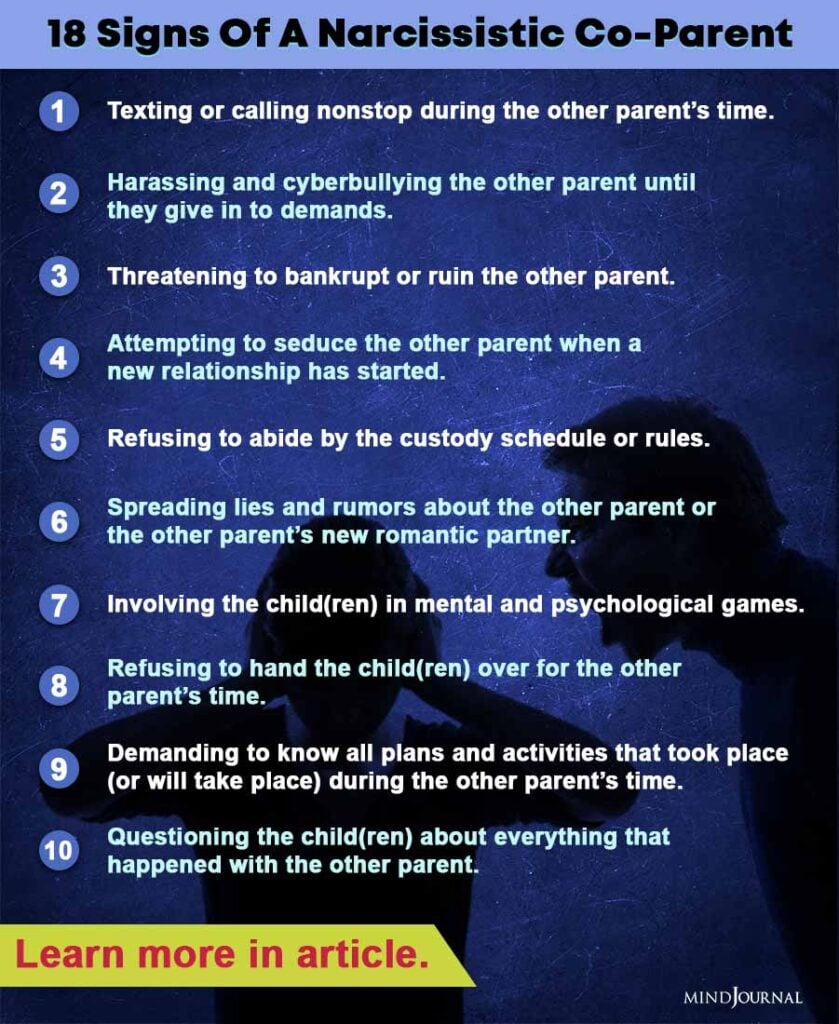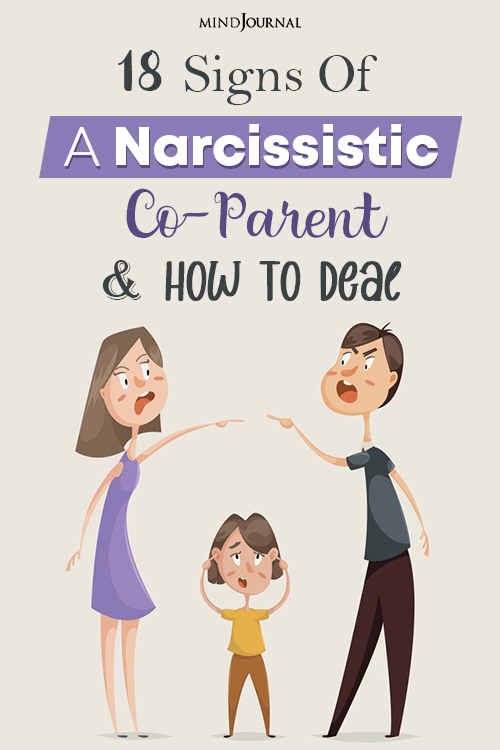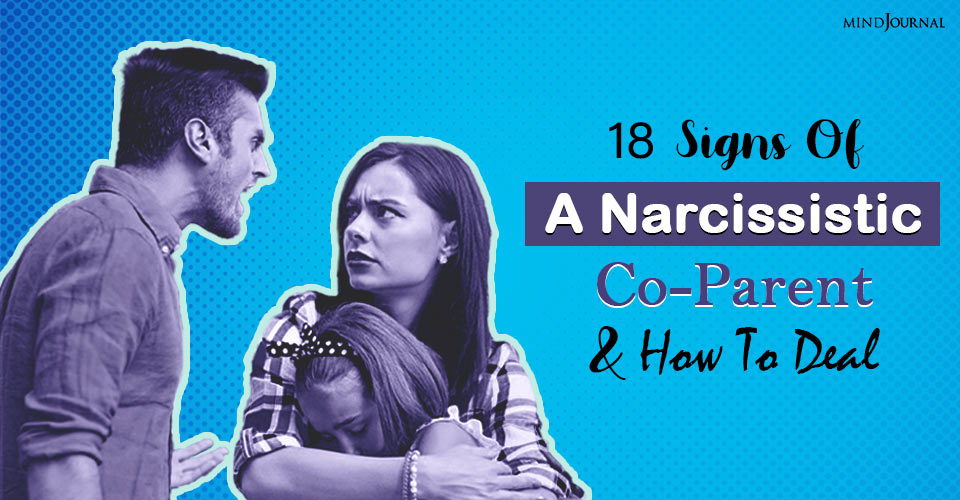Having a narcissistic co-parent is nothing short of a nightmare, and even more so, if they are particularly malicious. But when you have children, you have to find a way to deal with their narcissism effectively, without letting any of it affect your kids.
Key Points: Co-parenting is not an option for those with narcissistic traits and behaviors. Creating a custody plan with a narcissistic ex-partner is a task best left to legal professionals. A narcissist will do anything to cause problems in their co-parent's personal life and ruin their relationship with the child.
Co-parenting with a narcissist is impossible. At best, one can adopt a method of parallel parenting with strict boundaries and legal protection. A narcissist craves total control of a situation that keeps them calling the shots and setting the standards. What are the signs of co-parenting with a narcissist, and can the situation be salvaged?
Traditionally, co-parenting is described as when an adult assists the parents with the care and support of raising children including grandparents, aunts and uncles, and close friends. The concept of “co-parenting” as it relates to modern divorce and custody situations has only been widely studied since the 1970s.
Modern co-parenting is one that enables both parents to coordinate support, care, and control of the children without residing in the same household or being in a relationship together. This equates to sharing the child’s schedule, appointments, school issues, daycare and babysitting needs, medical needs, and more while still respecting the other parent as a separate entity.
Related: 9 Tips For Co-Parenting With Your Difficult Ex
Boundaries Of Co-Parenting
The concept of respect and privacy is why narcissists are unable to fully grasp proper, boundary-specific co-parenting. Shared custody of a child does not suggest that parents need to exchange their own personal schedules and itineraries. Obviously, work schedules need to be shared and pick up or drop off times coordinated, but only within the constraints of the child’s wellbeing.
Co-parenting, especially in a high-conflict divorce, does not mean being friends, spending holidays and vacations together, or getting permission from the other parent to date. Once a couple breaks up and separates, they are no longer a single unit and are free to date and spend their time how they choose.
Unfortunately, this equals a loss of control for the narcissist, and they react like a hurricane: explosively, violently, and determined to cause permanent damage.
A narcissist cannot just let the child go to the other parent for the weekend or even a few hours with no fuss. Conflict escalation, conflict creation, perceived slights, and any other minor snag in the schedule will be exaggerated and placed as blame on the shoulders of the non-narcissistic parent.
The narcissistic parent will attempt to impede upon the other parent’s time as much as possible through phone calls or texts or insist on attending activities with the other parent. Invasion of privacy doesn’t stop when the children are handed back to the narcissist. The narcissist will then insert themselves into the other parent’s personal life.
Parallel Parenting
Parallel parenting is a good option for a parent to carve out a new life without the narcissistic parent but can also be a struggle to implement. It must be accompanied by strong boundaries and solid legal paperwork.
Narcissists are unable to keep promises and believe their lies as truth; without a legal agreement, nothing can be upheld. Parallel parenting limits the interaction between the parents and each parent adheres to their own decisions, activities, actions, and parenting style.
Related: 15 Things You Can Do When Co-Parenting With A Psychopath
Signs Of A Narcissistic Co-Parent

A narcissist will find any way possible to complicate the other parent’s life, including:
1. Demanding to know all plans and activities that took place (or will take place) during the other parent’s time;
2. Refusing to hand the child(ren) over for the other parent’s time;
3. Texting or calling the parent, the child, (or both!) nonstop during the other parent’s time;
4. Questioning the child(ren) about everything that happened with the other parent, including what they ate, where they went, who they saw, etc. and then starting fights with the other parent;
5. Telling the children to record or take photos of the other parent, the house, activities, etc and sending them to the narcissistic parent to file unfounded claims with child protective services;
6. Involving the child(ren) in mental and psychological games, such as planning elaborate vacations or being the parent with no rules or punishments, and comparing everything to the other parent’s ability to plan or provide;
7. Harassing or cyberbullying the other parent’s friends, family, or new romantic partner;
8. Attempts to isolate the child(ren) from seeing anyone the narcissistic parent doesn’t “approve” of, even without reason. This could also include other family members or the other parent’s friends;
9. Insisting on celebrating holidays or special events together “as a family” despite the other parent not agreeing. Even when told no, the narcissistic parent will either show up (“It’s a public event!”) or guilt the children and other parent;
10. Alternately, will try to control other people who show up to events. (“You can come, but your new wife isn’t allowed.”)
11. Telling the children their other parent “won’t allow them” to be a family or spend time together and turning themselves into the suffering victim;
12. Refusing to abide by the custody schedule or rules, such as moving school districts or failing to give notice about taking the child out of state;
13. Changing their schedules or the children’s schedule without consulting with the other parent and telling them of changes at the last minute, forcing the other parent to accommodate and change their schedule;
14. Harassing and cyberbullying the other parent until they give in to demands;
15. Threatening to bankrupt or ruin the other parent;
16. Attempting to seduce the other parent when a new relationship is started;
17. Manipulating text conversations and presenting out-of-context statements to people in order to ruin the other parent’s reputation, friendships, or relationships;
18. Spreading lies and rumors about the other parent or the other parent’s new romantic partner to make themselves look better, sometimes using this to cause problems at work or in court. Narcissistic exes and co-parents have been known to accuse the other parent of drug and alcohol addiction, domestic abuse, rape, and stalking. These unfounded claims do nothing but complicate an already stressful and messy situation and irreparably damage reputations.
Parallel parenting can eventually give way to co-parenting over time, but when a narcissist is involved it is better to never lower your boundaries. The moment that you do, they will sneak back in with the intention of totally destroying your life and everything you have built since the separation.
Want to know more about how you can deal with a narcissistic co-parent? Check this video out below!
Preventing Problems
The best way to prevent problems is to go no contact or limited contact with your ex-partner and put everything in writing. If you must only communicate via email or text message to have a record of statements and harassment. Be as specific as possible in your custody documents, including ensuring privacy, limited contact, exact times and locations for pick up and drop off, and an explicit holiday schedule.
It is also worth looking into legal orders of protection or restraining orders. If your ex-narcissist is ever within the physical boundaries of your property or yourself, invest in a home security system with cameras to record interactions.
Make sure everything is included in the custody agreement, such as how many times day phone calls should be permitted. It may sound silly and unnecessary, but it will help when your ex is calling every hour demanding to know the child’s whereabouts and ruining your precious parenting time.
Clearly, a narcissist will never willingly agree to parallel parenting because that would force them to relinquish control over you. Keep in mind that this is your lawyer’s area of expertise so let them fight for you.
Although you will never be able to protect your child from the negative influence of their narcissistic parent, a parallel parenting plan with strong guidelines and boundaries is the best way to shield children from parental fights. The ultimate way to make the best out of a narcissistic divorce or custody battle is to improve and protect yourself.
Finding a good therapist, trusting your lawyer, and surrounding yourself with strong, loving individuals is just one barrier between you and your narcissistic ex. When you improve your life and get physically and mentally stronger, you are creating a better environment for your children. In turn, your children will want to be with you and in your environment.
Related: 7 Keys To Co-Parenting After You Have Remarried
A happy existence, despite the custody issues or financial stress, is something that your ex can never take away.
References:
"Coparenting". Mcconnell, M. C., MCCONNELL, M. C., VO, E. D., & MCHALE, J. P. (2003). Coparenting. In J. J. Ponzetti Jr. (Ed.), International encyclopedia of marriage and family (2nd ed.). Gale. Credo Reference: http://library.capella.edu/login?url=https://search.credoreference.com/… Higuera, V. (2019). What is parallel parenting? Plus, creating a plan that works. Healthline. https://www.healthline.com/health/parenting/parallel-parenting
Kristy Lee Hochenberger can be contacted for life coaching at [email protected] and facebook.com/excelsiorcoaching
Written By Kristy Lee Hochenberger Originally Appeared On Psychology Today











Leave a Reply